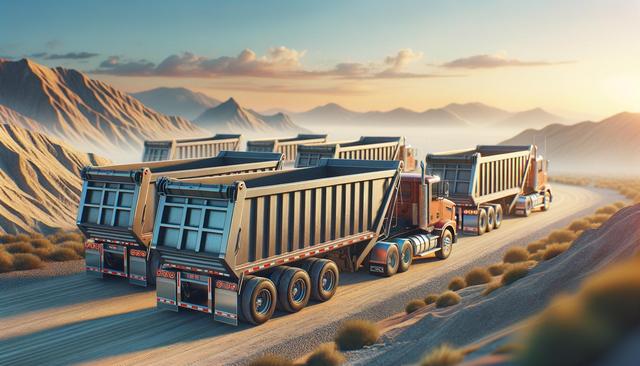Understanding Dump Trailers and Their Purpose
Dump trailers are specialized hauling tools designed to transport and unload large quantities of materials efficiently. Unlike conventional flatbed or enclosed trailers, these units are equipped with hydraulic mechanisms that allow the trailer bed to tilt, making it easier to dump contents like gravel, soil, or construction debris. Dump trailers are widely used in construction, landscaping, agriculture, and waste management industries due to their durability and functionality. Dumster trailers are often used interchangeably with dump trailers, though some variations exist based on design and intended use. These trailers cater to both commercial and personal projects, offering a practical solution for those needing to move heavy or bulky items.
Key Features and Configurations
When looking into dump trailers, it’s important to understand the different features and configurations that affect performance and suitability for specific tasks. These trailers come in various sizes, load capacities, and bed styles. Some of the most common features include:
- Hydraulic lift systems for easy unloading
- Steel or aluminum construction for enhanced durability
- Dual or triple-axle setups for increased load support
- Removable or fold-down sides for added flexibility
These variations allow users to choose models based on their exact needs. For example, smaller dumster trailers might be ideal for residential clean-ups, while larger units can handle commercial-grade tasks such as hauling demolition waste or transporting heavy equipment. The choice of material, such as aluminum for lighter weight or steel for toughness, also depends on the intended frequency and type of use.
Common Applications in Various Industries
Dump trailers are valued across a broad spectrum of industries thanks to their efficiency in handling heavy loads. In construction, they are used to transport building materials and remove debris. Landscapers rely on these trailers to move mulch, soil, and rocks quickly between job sites. Farmers use them to carry feed, hay, or harvested crops. Even event organizers and municipal workers use dumster trailers for setting up and cleaning venues or parks.
Some typical use cases include:
- Transporting gravel or sand for roadwork
- Clearing out renovation debris
- Hauling tools and supplies to remote job sites
- Managing storm clean-up efforts
The ability to unload materials with minimal manual effort not only saves time but also reduces the physical strain on workers, making dump trailers a practical investment for any labor-intensive field.
Choosing the Right Dump Trailer
Selecting the right dump trailer requires careful consideration of your specific needs and the trailer’s specifications. Start by evaluating the volume and type of material you will be hauling regularly. Will you need a high-capacity trailer, or will a smaller dumster trailer suffice for occasional use? Axle ratings, trailer weight, and towing vehicle compatibility are also essential factors to consider.
Some tips when choosing include:
- Check the trailer’s gross vehicle weight rating (GVWR)
- Ensure your towing vehicle can handle the loaded weight
- Look for additional convenience features like tarp kits or ramps
- Consider local regulations and licensing requirements
By matching the trailer’s features with your operational demands, you can ensure efficient, safe, and long-lasting use. Consulting with experienced suppliers or rental providers can also offer valuable insights into which model may work best for your context.
Maintenance and Safety Considerations
Proper maintenance is crucial to keeping dump trailers in optimal working condition. Regular inspections should be conducted to check for signs of wear, rust, or hydraulic issues. Keeping the trailer clean, especially after hauling corrosive materials, extends its lifespan and ensures safer operation. Tire pressure, brake systems, and lights should also be checked frequently, especially if the trailer is used often or for long-distance hauling.
Safety practices are equally important. Operators should always:
- Use wheel chocks when loading or unloading
- Ensure the load is evenly distributed to prevent tipping
- Secure all materials with straps or covers
- Follow the manufacturer’s guidelines for weight limits and dumping angles
Routine maintenance and a strong focus on safety not only protect the equipment but also minimize the risk of workplace accidents, making dump trailers a reliable part of any job when managed correctly.
Conclusion: A Reliable Tool for Heavy-Duty Tasks
Dump trailers and dumster trailers offer practical and efficient solutions for transporting and unloading heavy materials. Whether you’re a contractor, landscaper, farmer, or homeowner with large-scale projects, these trailers can significantly streamline your workload. Choosing the right model and maintaining it properly ensures long-term usability and safety. With thoughtful selection and responsible use, dump trailers can become an indispensable part of your equipment lineup, helping you complete demanding tasks more efficiently and effectively.








